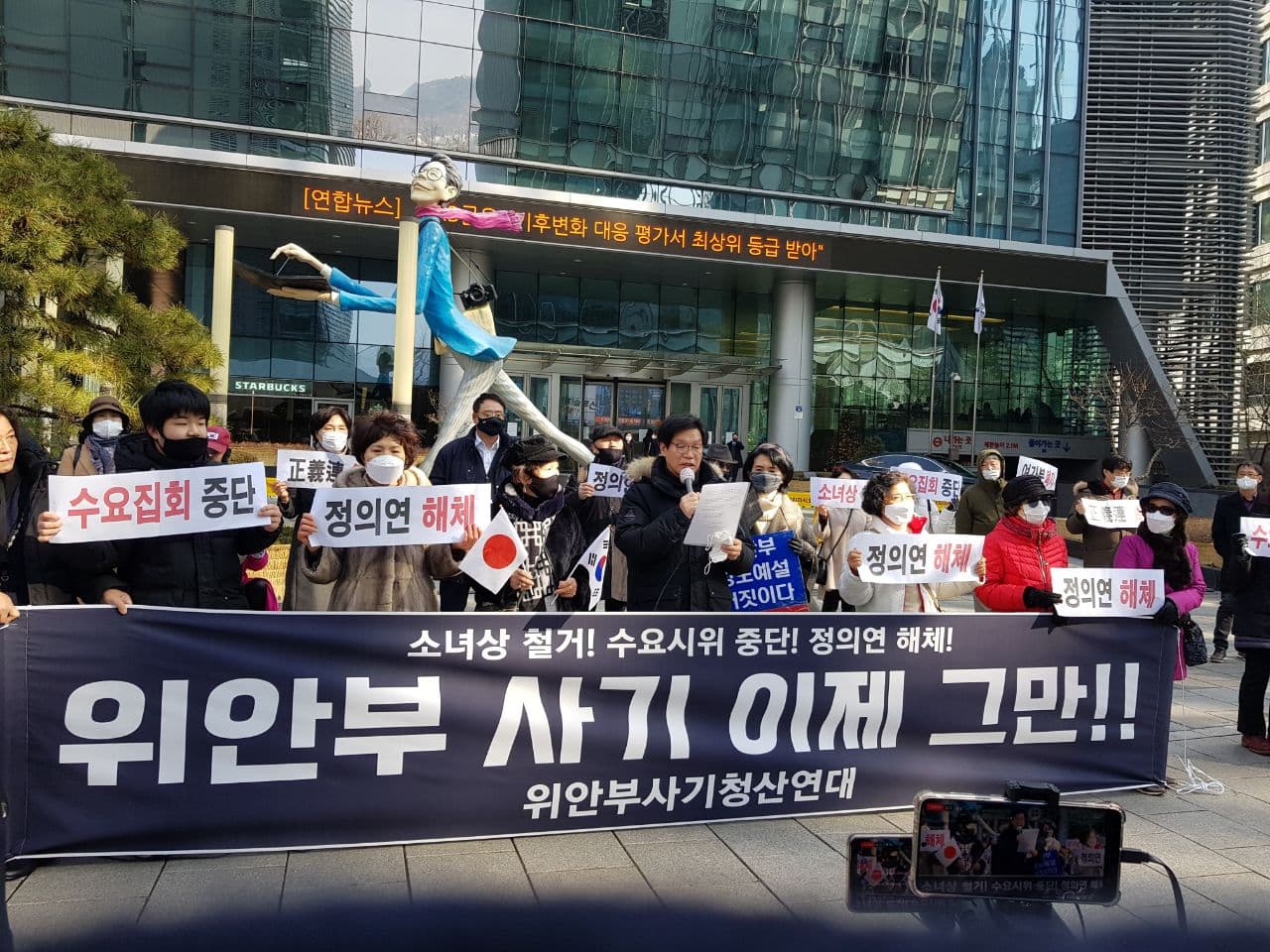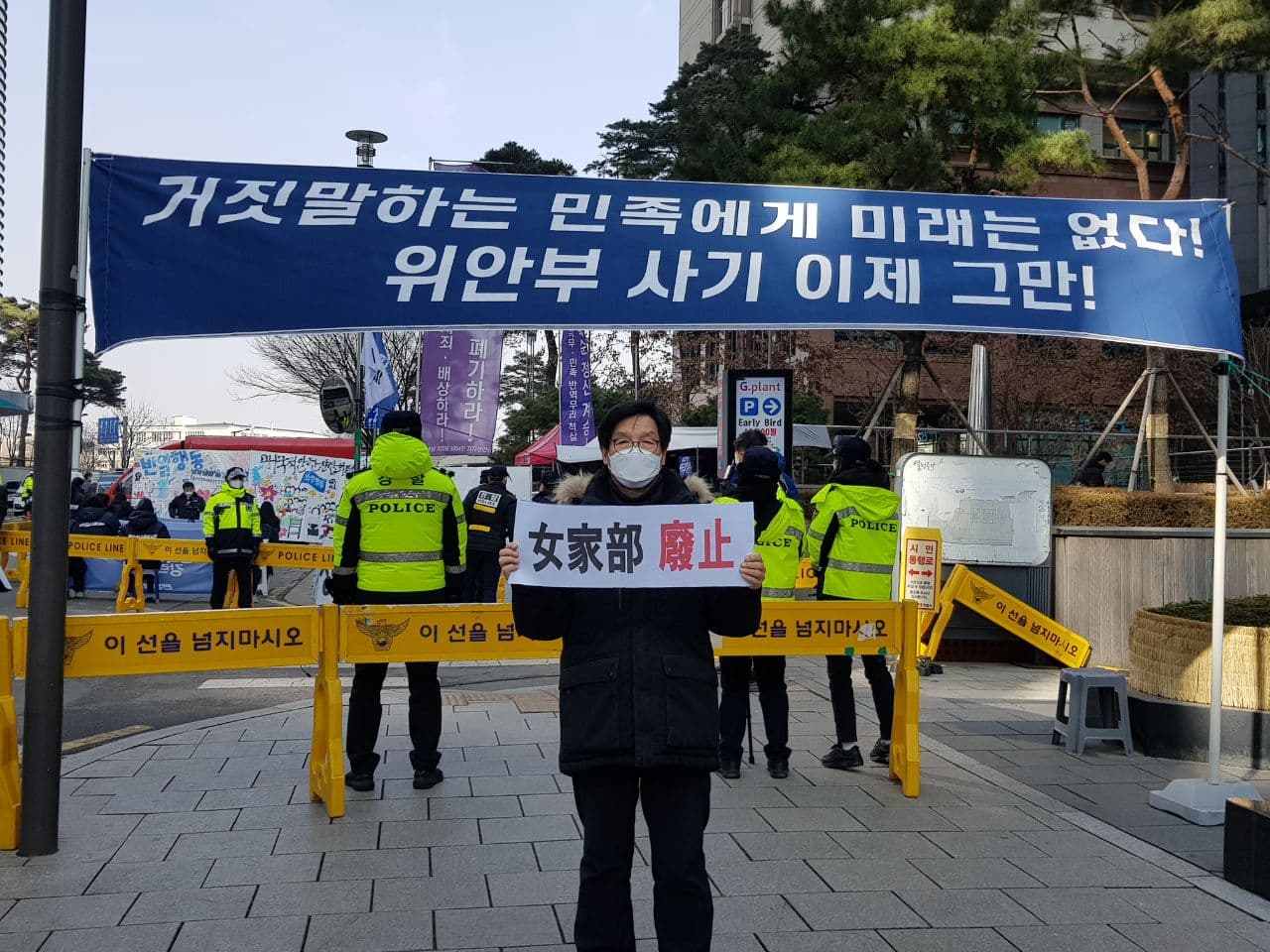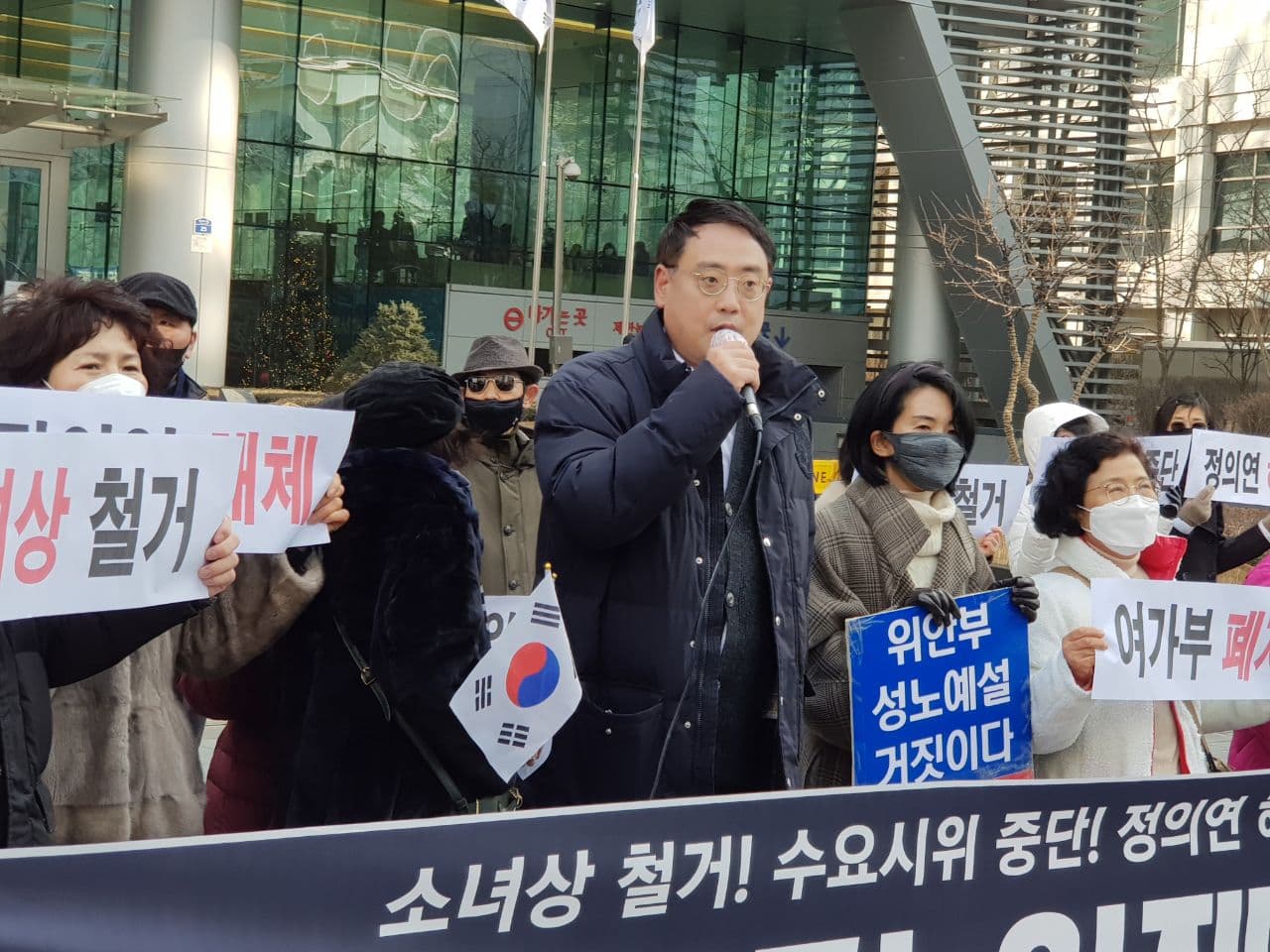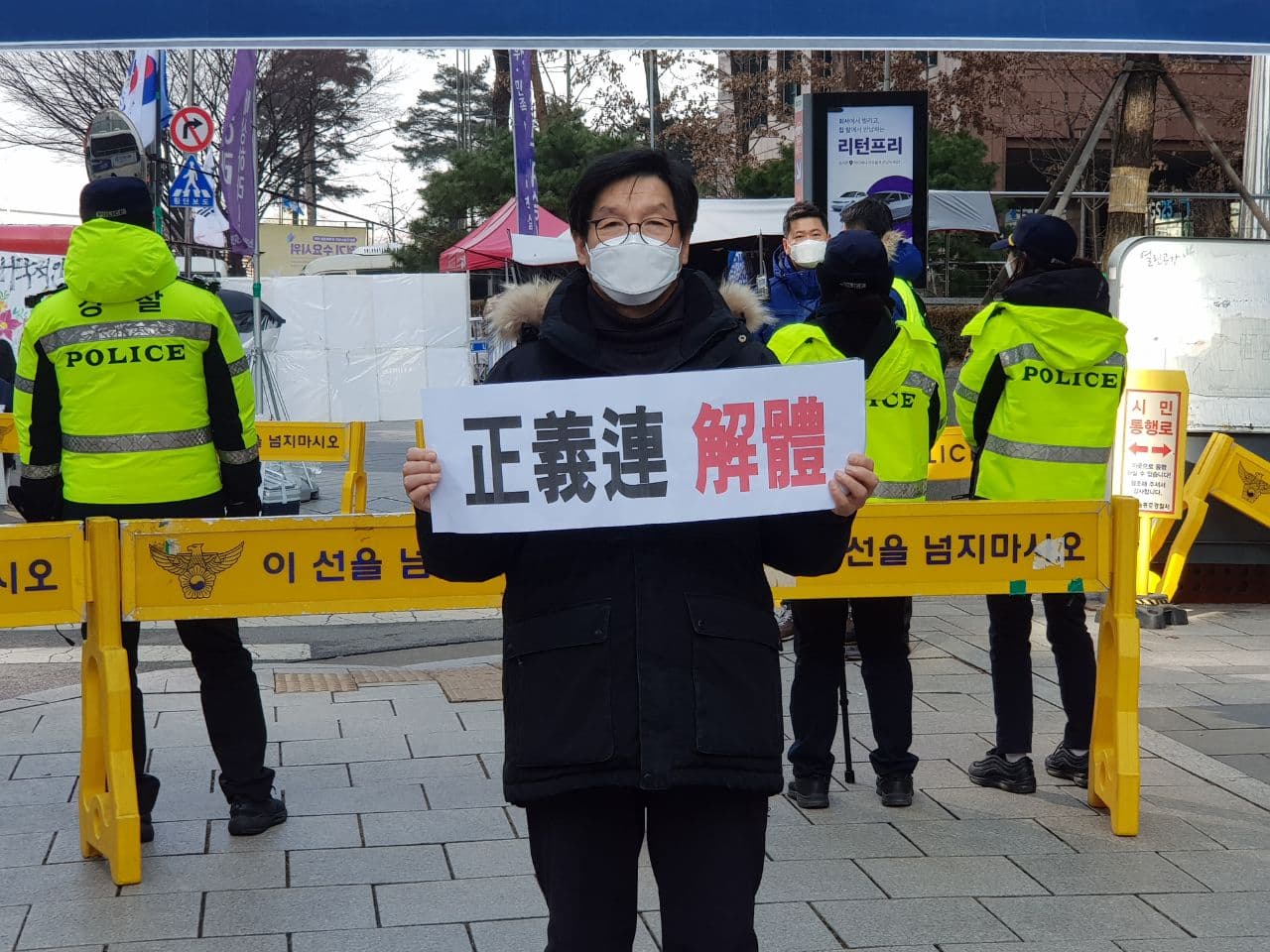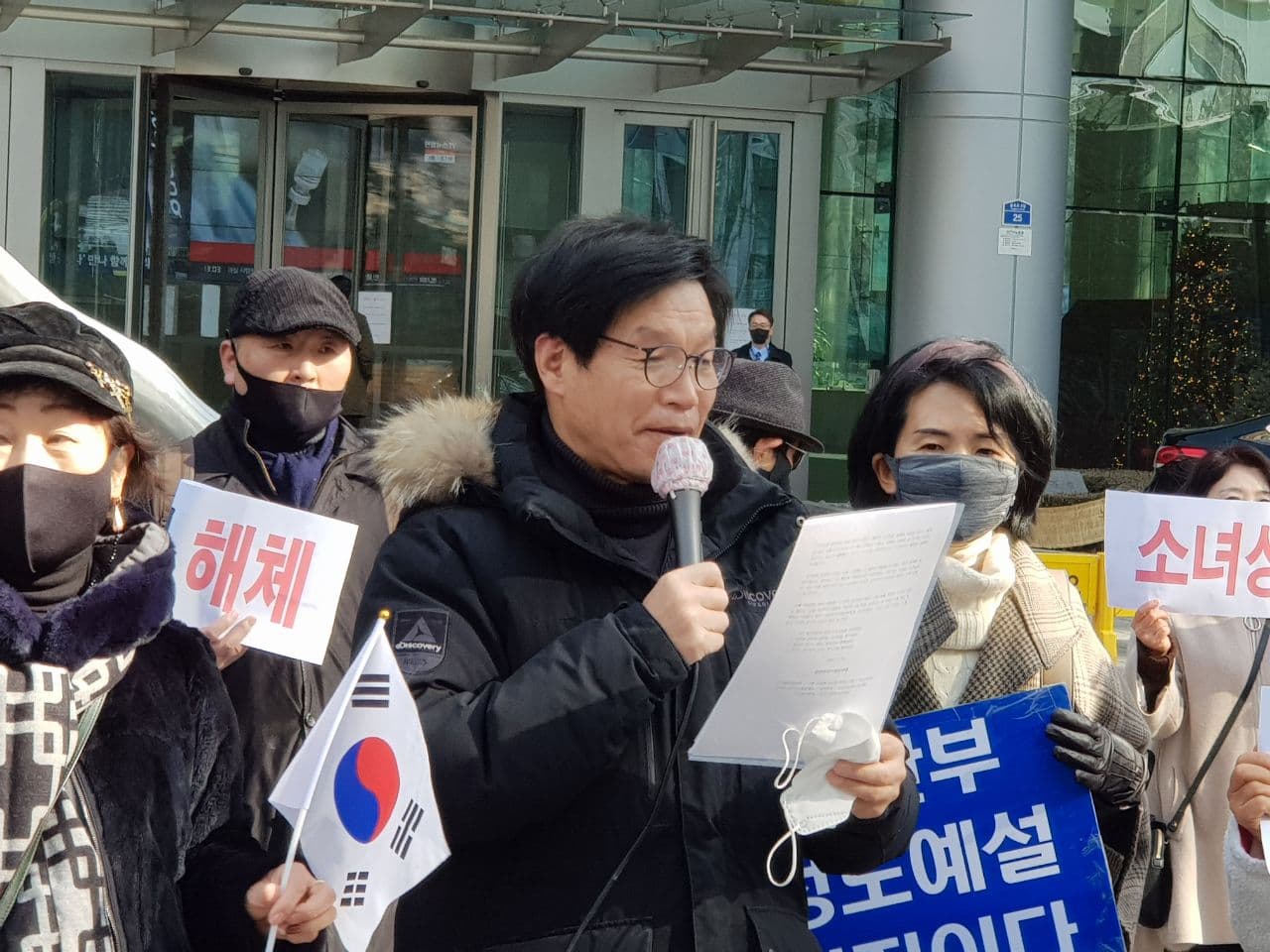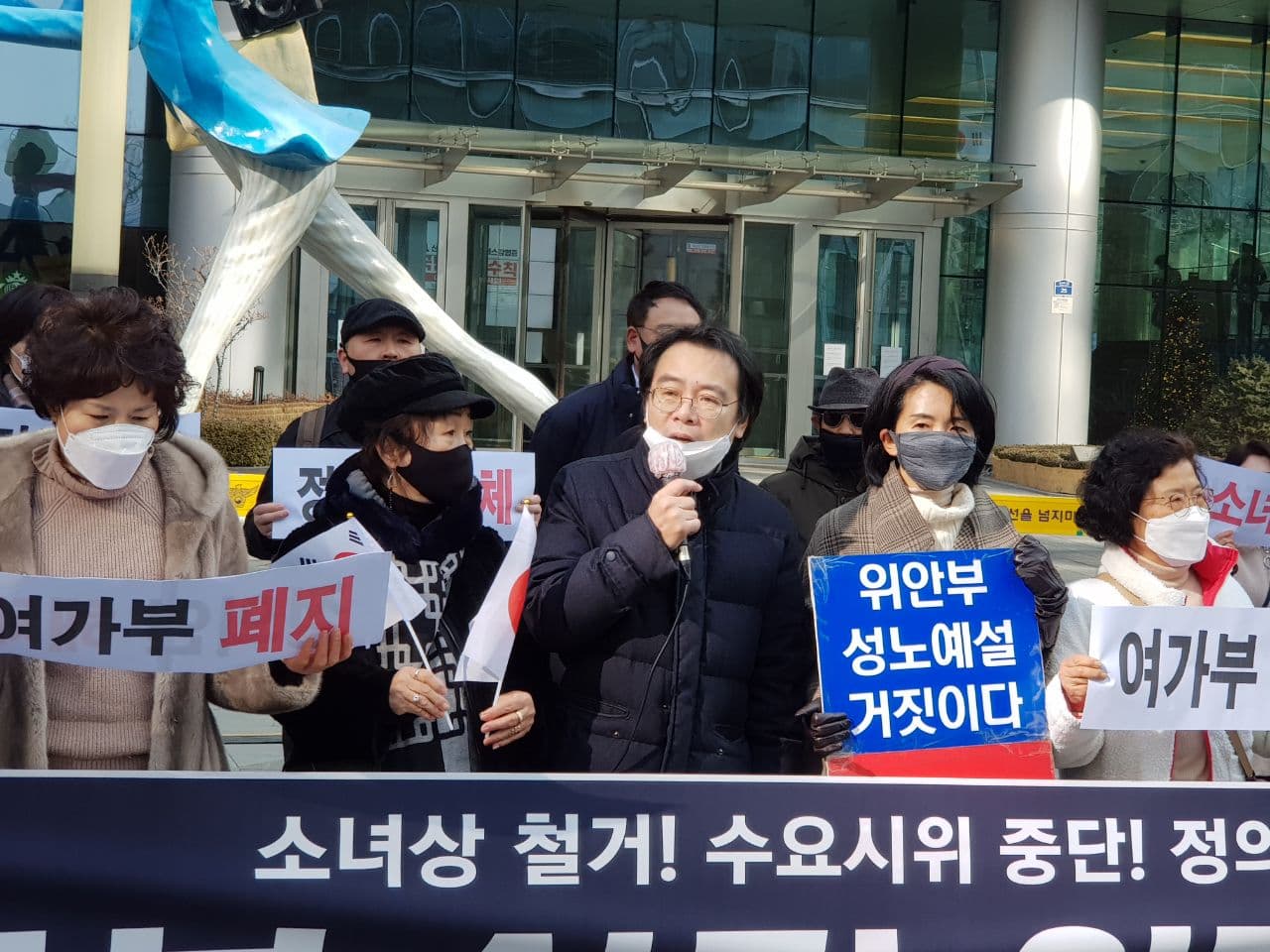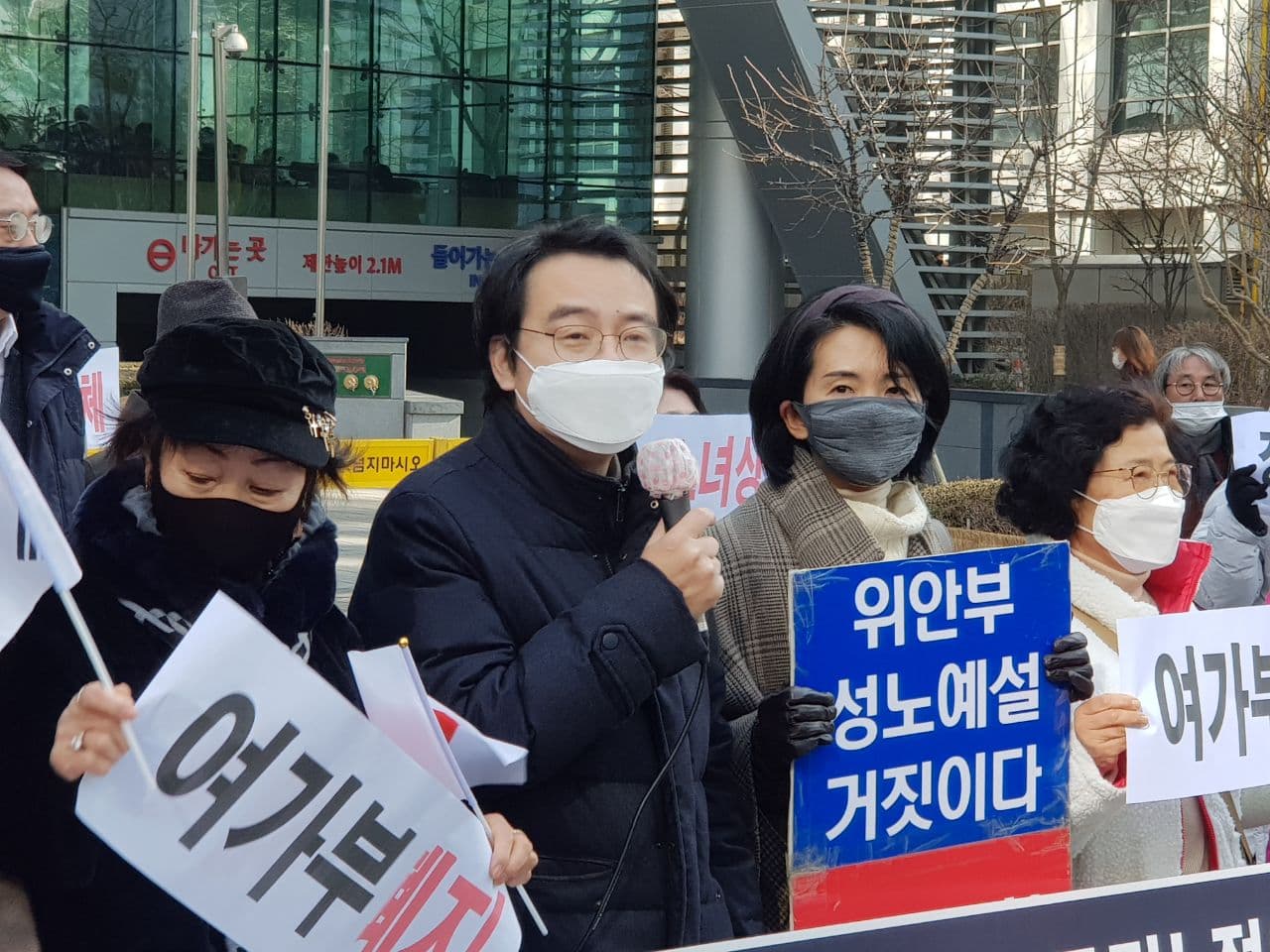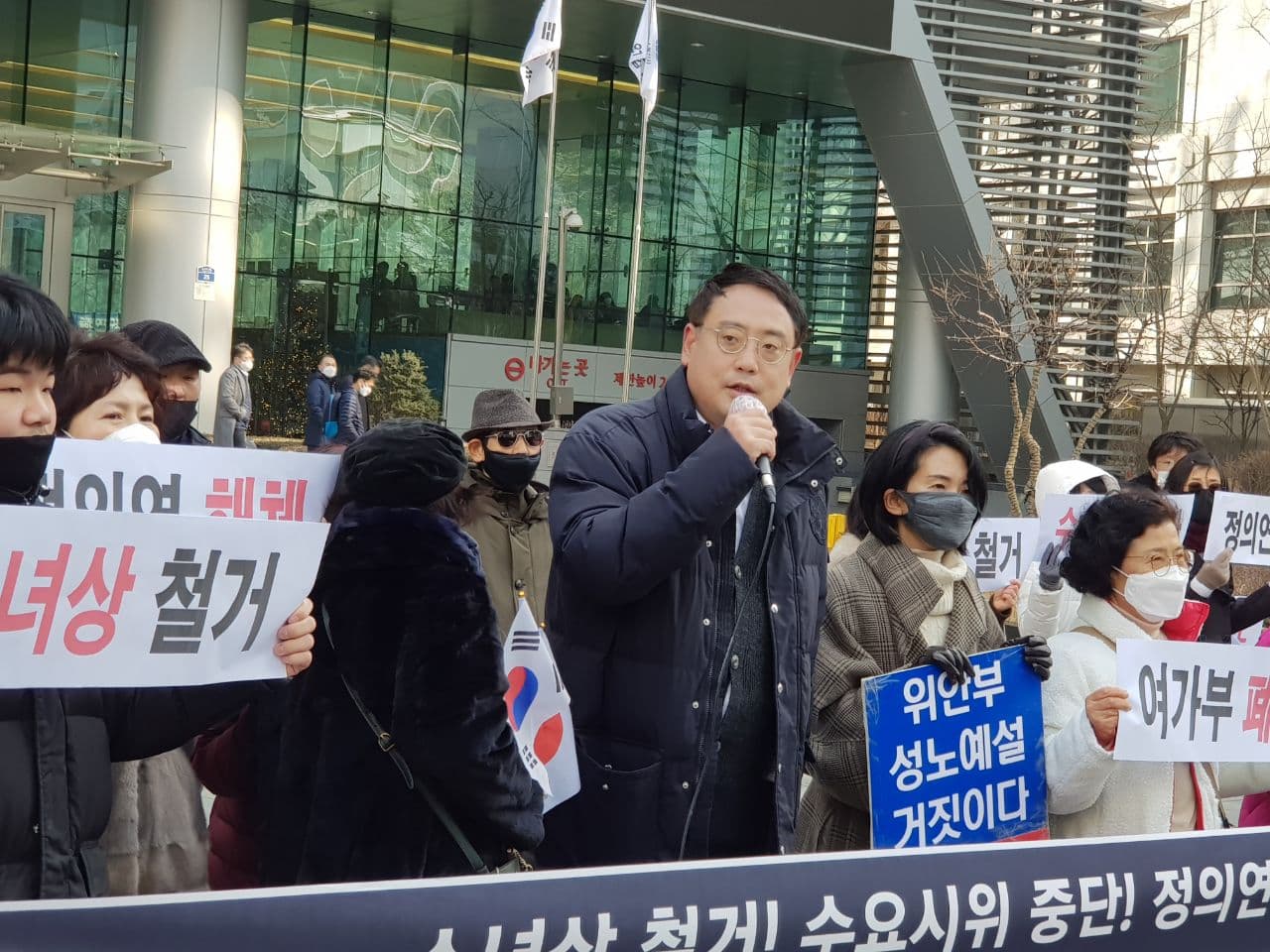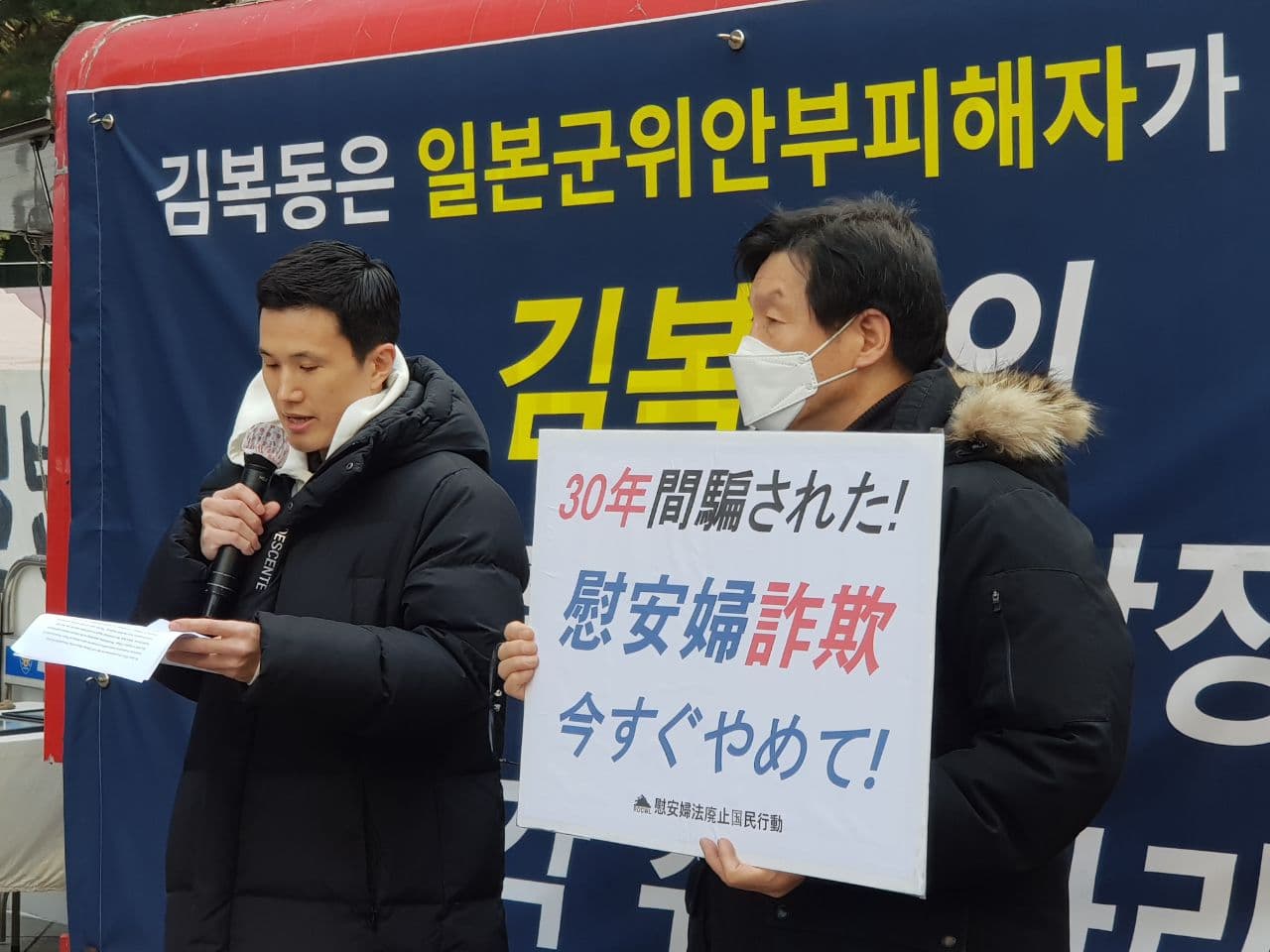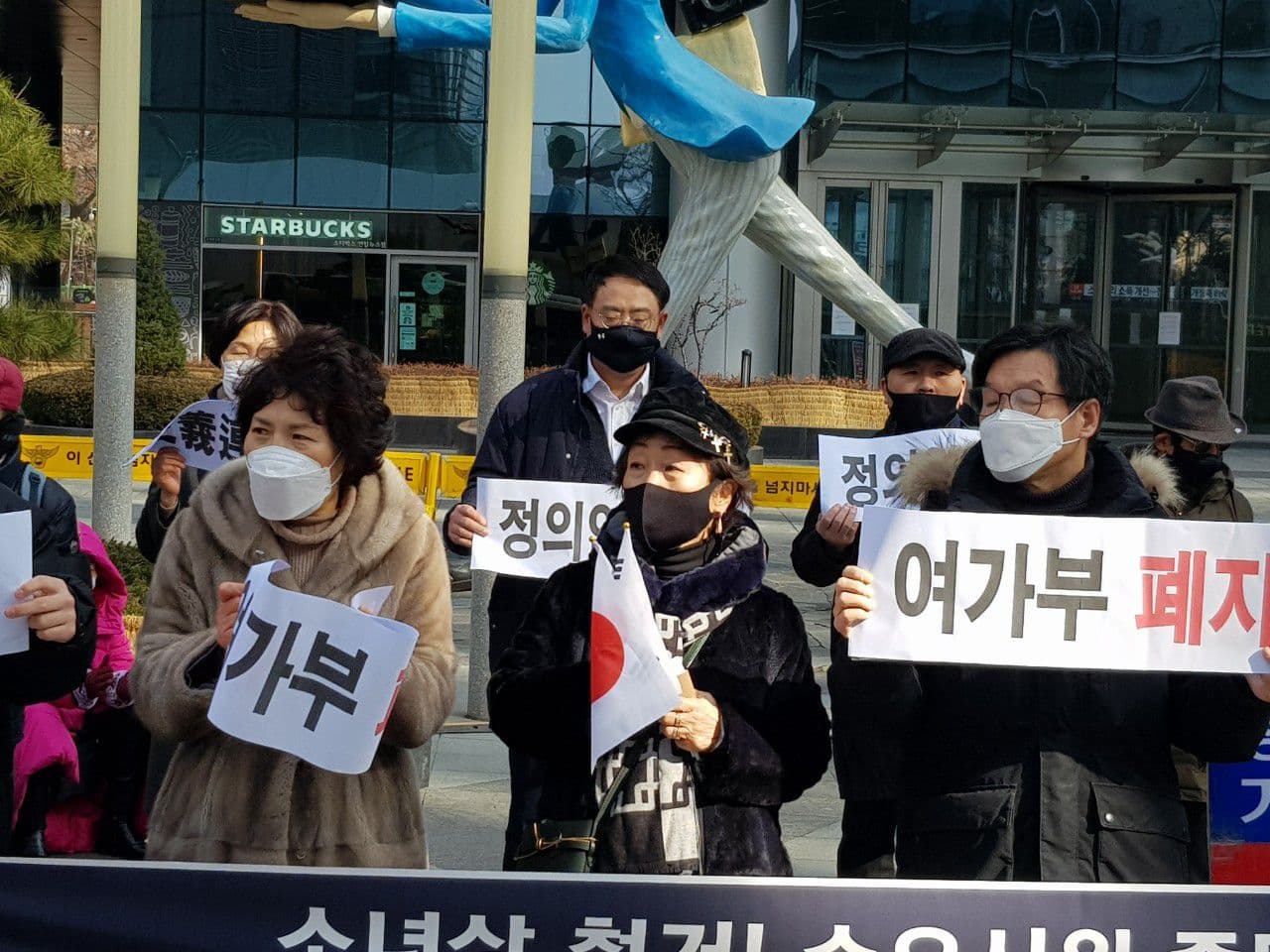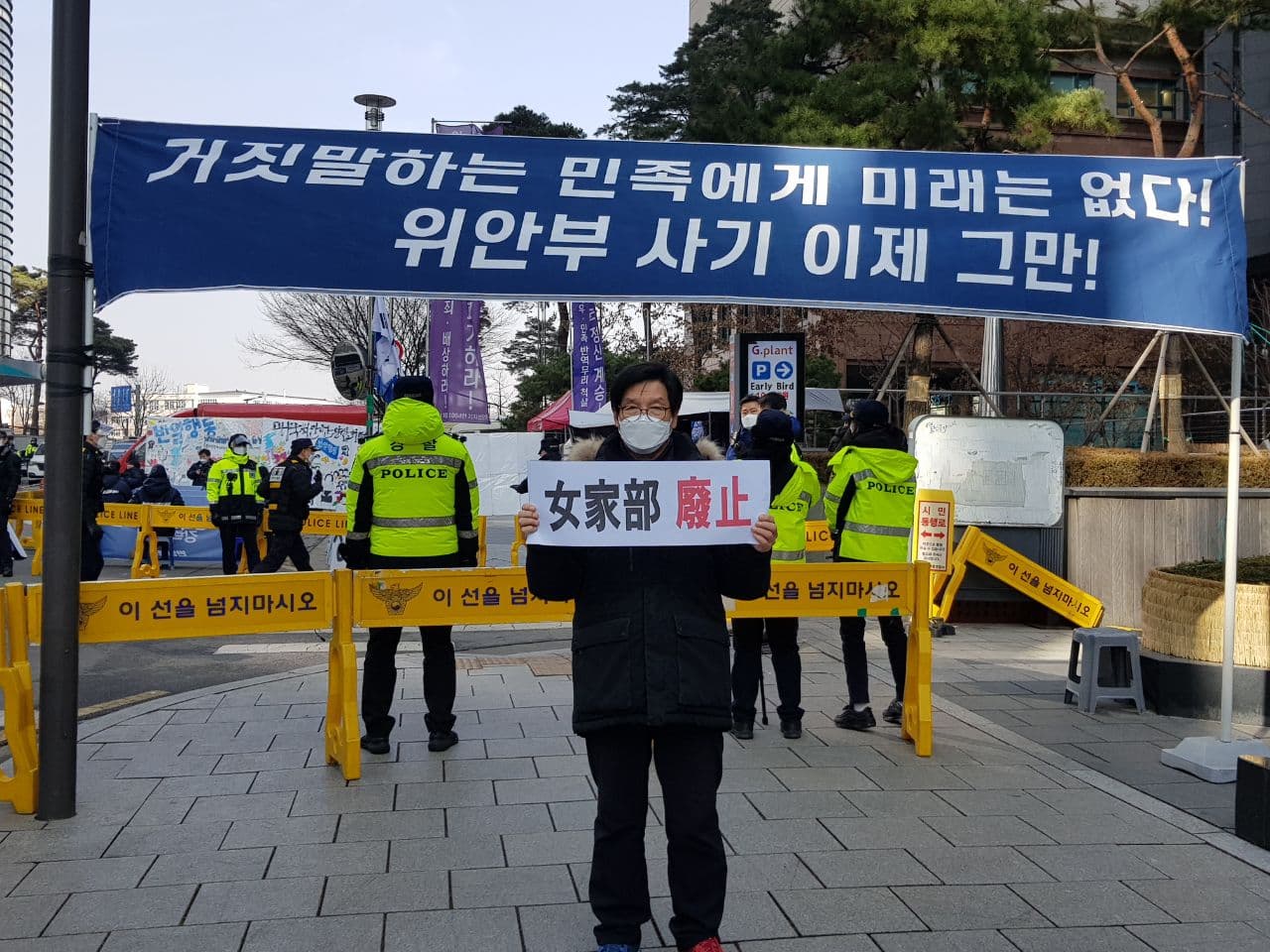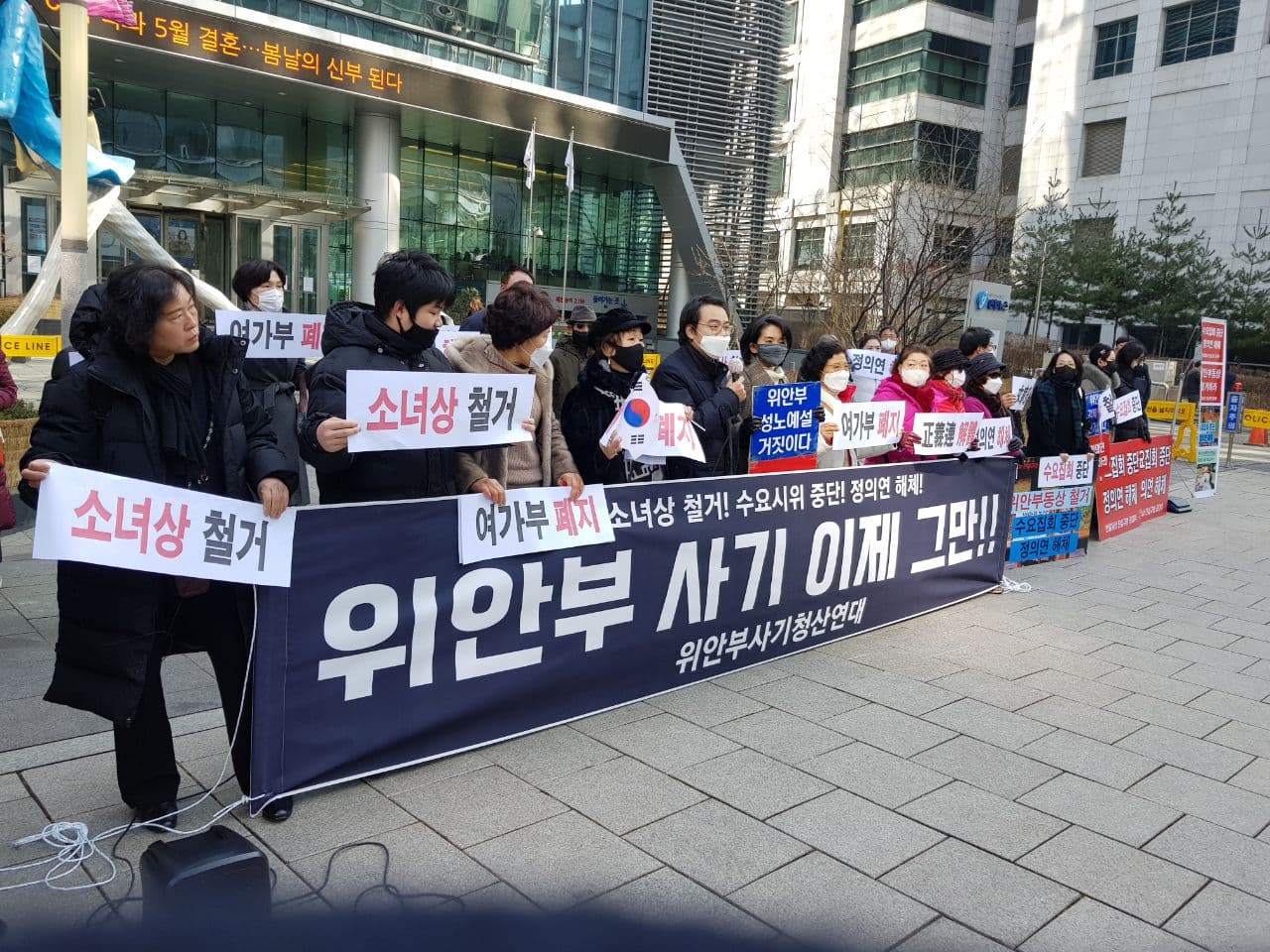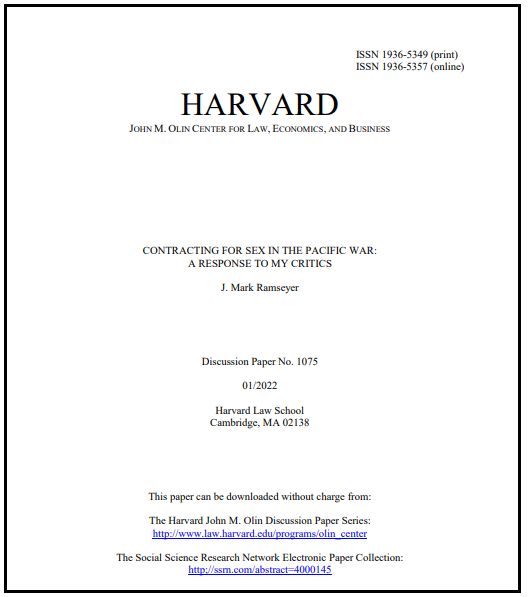
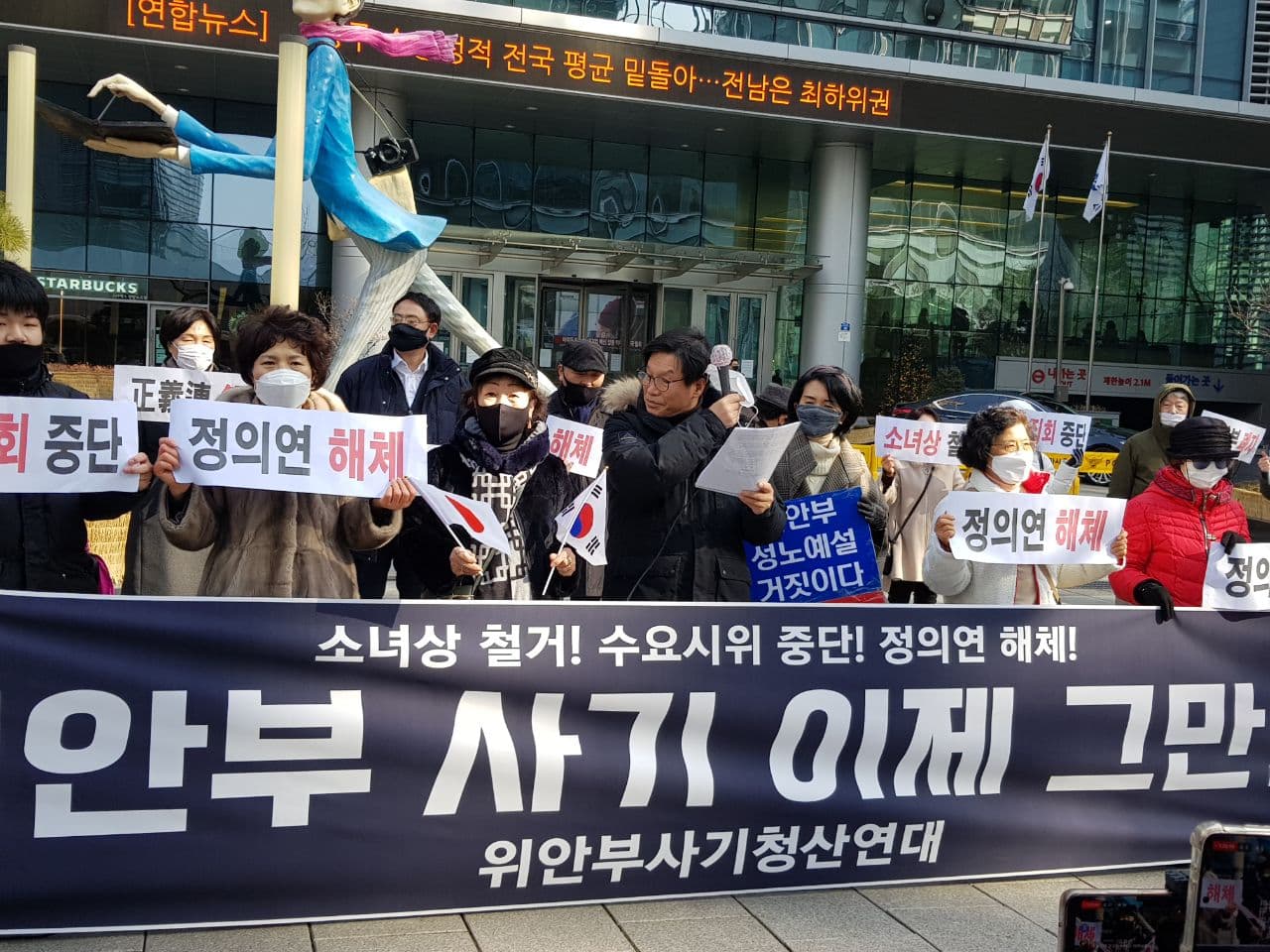
米国ペンシルバニア州フィラデルフィアの公園に昨年2021年から慰安婦像の設置計画が進んでいます。
平和の像計画 the Statue of Peace projectと称していますが、韓国ソウル日本大使館前の慰安婦像と同じものです。
2022年2月9日にはフィラデルフィア市が説明会を開きます。参加者、質問を募集中です。
設置活動の中心となっているのはフィラデルフィアの韓国系の団体 The Korean American Association of Greater Philadelphia (KAAGP)。
資金集めサイトには、「 1932-1945年に日本帝国陸軍によって強制的に性奴隷にされたアジアとオセアニア地域の20万人の少女と女性 (200,000 girls and women from Asia and Oceania who were removed from their homes and coerced into sexual slavery by the Imperial Armed Forces of Japan between 1932 and 1945.)」を記念するためと書いてあります。
このフィラデルフィア慰安婦像計画に対して、韓国ソウルで市民団体が反対の声明を発表しました。
2022年1月26日に行われた街頭活動と声明文(日本語・英語・韓国語)をご紹介します。
【 英語で声明文を読み上げる青年 生中継のアーカイブから 】
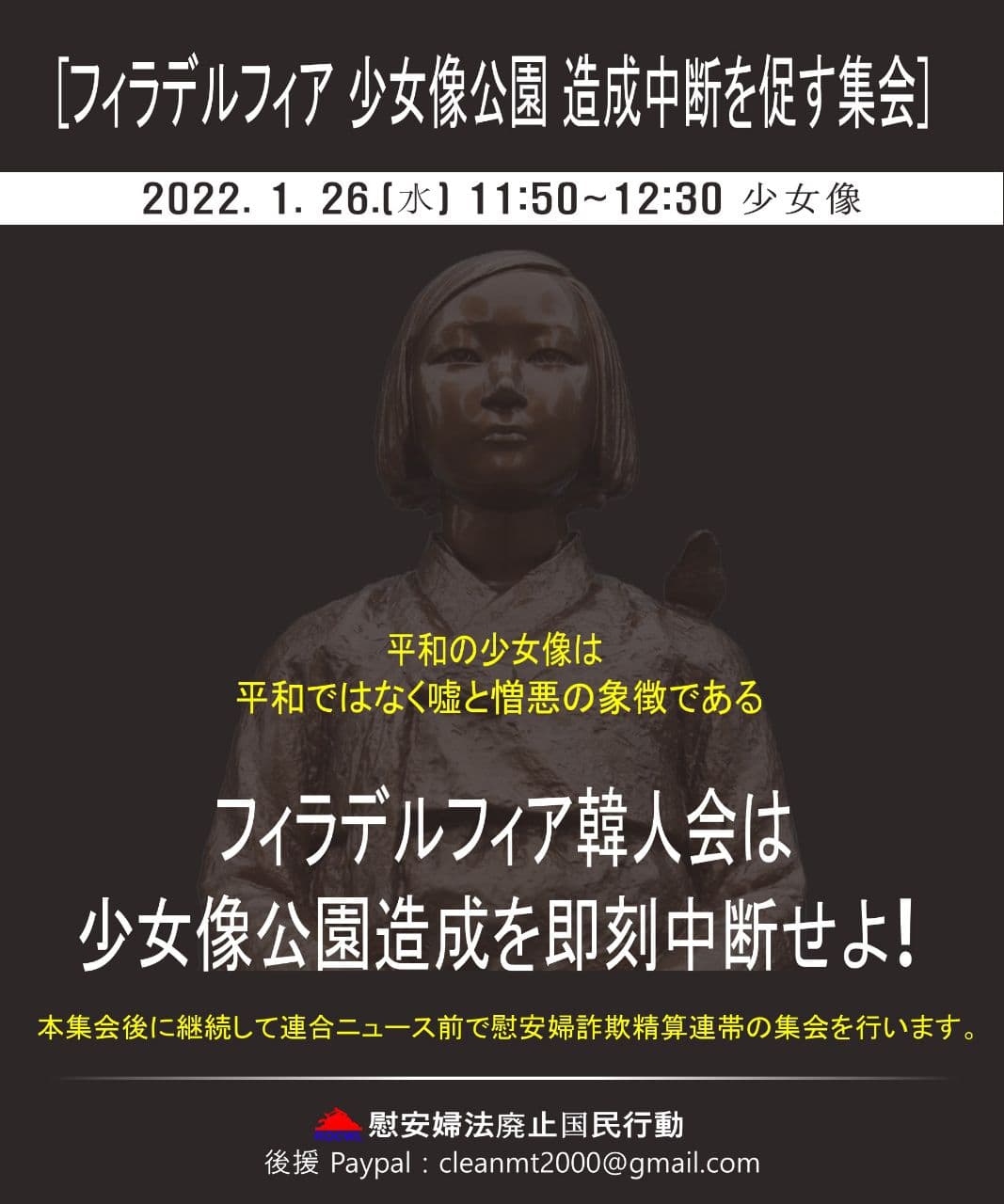
*********************************************************
【 声明文 PDF 】
2022. 1. 26.
慰安婦法廃止国民行動
声明文
フィラデルフィア韓人会は、少女像公園造成を直ちに中断せよ!
昨年6月、韓国国内のあるインターネット新聞によると、米国フィラデルフィア韓人会少女像公園推進委員会(以下推進委員会)がフィラデルフィア市クイーンビレッジのある街路公園に日本軍慰安婦被害者を象徴する「平和の少女像公園」(Statue of Peace Plaza)を造成すると発表した。 そのため、様々な行政的手続きとともに募金を進めてきており、推進委員会の要請を受け、2月9日にはフィラデルフィア市が「平和の少女像公園」建設に関する説明会を行うとしている。 推進委員会が設置しようとする少女像はキム·ウンソン、キム·ソギョン夫妻が制作したものだという。 国内外に最も多く設置された少女像である。
しかし、この少女像は彫刻家の間違った慰安婦認識と対日敵愾心が投影された偽りと憎悪の象徴物だ。 彫刻家は「空いた椅子に刻んだ約束」という自身の作家ノートで「日本による植民地時代朝鮮の花のような年頃の少女たちと若い女性たちをだましたり強制的に戦場に連れ去ったりして性奴隷とし、ひどい場合は殺す無残な犯罪をためらわず犯した残酷な歴史を記憶させたかった」と書いているが、これは歴史的事実に合致しない作家の歪曲した認識と憎悪心の表現に過ぎない。
作家は日本軍が朝鮮少女を強制的に動員したと主張したが、日中戦争と太平洋戦争の時、朝鮮の女性はいかなる名目であれ、軍の動員対象ではなかった。 日本軍は日帝の国家公務員であり、彼らの行為は公務であるため、慰安婦を動員するためには法令に従わなければならないが、慰安婦を動員する法令はなかった。 たとえ動員することがあったとしても、公務は招集令状などの文書を交付して場所と時間を告知すべきであって、骨身を削って引っ張っていくことはできない。 慰安婦は企業主の募集対象に過ぎず、公務上の動員対象ではないため、「慰安婦強制動員」という前提自体が間違っている。
次に慰安婦を日本軍性奴隷と主張するが、これも偽りであることは同じだ。 もし、慰安婦が日本軍の性奴隷だったとしたら、日本軍は誰であれ、またいつでも慰安婦を対象に自分の性欲を満たして暴行を加え、必要ならば売り渡すこともできなければならない。 しかし、日本軍は慰安所規定に定められた階級別の時間料金を支払らってはじめて、慰安所を利用することができた。 お金があれば利用でき、なければ利用できなかったし、 慰安婦にむやみに接することもできなかったのだ。 所定の費用を受けて性的サービスを提供する職業女性を軍人が果たして奴隷のように扱得られるだろうか。
戦争犯罪の被害者という主張はさらにとんでもない話だ。 1998年のゲイ·マクドゥーガル国連人権委報告書によると、国際紛争や武力衝突地域で敵対国の女性を拉致、強姦、殺害するなどの行為が戦争犯罪だ。 しかし、朝鮮と日本は相互武力衝突国家でないうえ、当時、朝鮮の女性は日本国民だった。 さらに慰安所は占領地の女性に対する強姦のような戦争犯罪防止のために設置·運用された合法的な売春空間だった。 戦争犯罪防止のために合法的に設置された慰安所で雇い主と雇用契約を結んでいた女性を何故戦争犯罪被害者と言えるだろうか。
最後に、作家は日本軍に騙されたり、強制的に戦場に連れ去られた10代前半から半ばの若い女性を作品に表現するため、11歳の娘をモデルに13歳から15歳の少女の姿で少女像を制作したという。 しかし、日本軍の慰安婦になるためには、出国前に抱え主と契約を結んだ後、身分証明書の発給を受けなければならず、現地に到着してからは現地領事館警察に出頭し、親権者の承諾書、戸籍謄本、印鑑証明書、営業許可願書、営業人調査書、写真2枚を提出し、営業許可を受けなければ慰安婦生活をすることができなかった。 むろん、戸籍謄本は親権者の確認のほかにも年齢を確認することができるため、これを欺くことは不可能だった。 問題は当時、日本軍の慰安婦は17歳以上でなければできなかったため、13~15歳の少女はそもそも日本軍慰安所で働くことができなかった。
以上に述べたように、国内外に設置された数多くの慰安婦少女像は、すべて慰安婦に対する歪曲·捏造された情報を基に製作·設置された。 しかも、これら慰安婦相は表向きには平和という名を掲げているが、実際は国内外で絶えず葛藤と反目をもたらし、韓日関係を破綻に追い込んでいる嘘と憎悪の象徴物だ。 少女の像が一つずつ建てられた瞬間、韓日関係はさらに崖っぷちに立たされるのだ。
日本軍慰安婦問題の本質は貧困だ。 国が貧しく、親が貧しく、喉元へ糊塗する道を求めて悪のどん底に陥ったケースがほとんどだ。 家族のために自らを犠牲にしたり、親が何円かのお金をもらって子どもの背中を押すなど、慰安婦業に入った経路が実に多様だが、皆が貧困のために生じた恥ずかしく悲しい我々の自画像だ。 決して繰り返してはならない歴史の教訓にするとしても、反日宣伝扇動の道具にすることではない。
大韓民国は建国以来、反日勢力が数十年間、慰安婦問題をはじめとする様々な名分で反日感情を助長し、韓日間の葛藤と対立を扇動してきた。 これにより我々が抱えた有形無形の金銭的損失が数百兆ウォンにはなるだろう。 現在も、徴用労働者と慰安婦問題で、韓日関係が有史以来、最悪の状況に突き進んでいる。 状況がこうなのに、米国でまた少女像を建てるということは、火事になった家に油を注ぐようなものだ。 あなたたちはこれによりもたらされるであろう大惨事にどのように責任を負うのか.
フィラデルフィア韓国人会は、今からでも少女像公園の造成が、母国大韓民国に取り返しのつかない破局をもたらすという点を認識し、少女像公園の造成を直ちに中断することを望む。 フィラデルフィア市民は、少女像公園が韓米日三国間の葛藤の火種になるだけで、いかなる実益もないことを肝に銘じ、この公園造成に積極的に反対することを心から願う。
***************************************************************
January 26, 2022
Network of National Movements to Abolish the Comfort Woman Legislation
A LETTER OF PROTEST
Discontinue immediately the Philadelphia Korean American Association’s vicious attempt to build a Statue of Peace Plaza!
In June 2021, the committee for the Girl Statue Plaza of the Philadelphia Korean American Association made public a project to add a Statue of Peace Plaza at a site of the park in Queen Village, Philadelphia, according to the Internet Journal published in South Korea. Since then, the committee began to coordinate with the city hall and solicit donations from the local residents. The city hall will hold briefing and hearing sessions on February 9, in response to a request submitted by the committee to construct the plaza. The statue of a girl will be designed by the couple Kim Seo-kyung and Kim Eun-sung as is often the case with similar statues erected both in South Korea and other parts of the world.
The Girl Statue is, however, nothing but the willful misunderstanding of the comfort women issue and the wrongful anti-Japanese hostility espoused by sculptor Kim Seo-kyung. Regarding his note titled “A Promise Engraved on the Empty Bench,” Mr. Kim wrote, “During the days of the annexation of Korea by Japan, innocent Korean girls and young women were deceived or kidnapped to warfront to be made sexual slaves. In some cases, they were killed. What I did by designing the statue was for a cause to hand down the hideous acts in history.” Truth is the statue is the product of no more than distorted historical facts and unfounded hatred.
Though the sculptor claims the Japanese military forcefully conscripted the Korean girls, the Japanese military, in any capacity, had not made them subjected to any mobilization during the Second Sino-Japanese War and the Pacific War. The Japanese troops were public servants and, therefore, had to follow laws and regulations. There was no law or regulation to mobilize comfort women. It must be noted that an official duty required an official order to carry out. In the absence of such a duty or order, no one could take the women out to warfront. It is the private managers who, in reality, employed for money the comfort women. In other words, there was No Conscription of Comfort Women in those days, period.
South Koreans, expatriates or not, also claim the comfort women were sexual slaves for the troops. This is another false claim. Fact is that the troops paid money according to their rank to the comfort station manager, that each of them was given a certain time to be with a comfort woman, and that comfort women earned money for their sexual service. The women engaged in prostitution as profession were not sexual slaves.
Were the comfort women victims of war crime? No! The McDougall Report of 1998 submitted to the United Nations Human Rights Commission states, in part, war crimes are defined as one nation’s troops committing kidnapping, raping, and murdering women of an adversary nation during an international conflict or an armed clash. Korea and Japan were not hostile with each other then. Korean women, as well as Korean men, were Japanese nationals. The comfort stations were provided for troops so as not to rape women in the occupied areas. The stations were legal entities, not to mention the official contracts the station managers and comfort women signed with each other. Those women should not be regarded as the victims of war crimes.
The sculptor Kim Seo-kyung, while visualizing the statue as a teenage girl who had been deceived and kidnapped by the Japanese military to warfront, asked his 11-year-old daughter to model for it. His idea is wrong in that a woman had to sign a contract with a prostitution agent, obtain a permit from police, present herself at the police division of a Japanese consulate. Each woman who had to follow those procedures must also present a letter of consent from her father or legal custodian, a copy of her family register, a certificate of the family seal, a written request for permission to do business, a certificate of a business investigation result, and two photographs. Upon completion of those stringent procedures, one could officially work at a comfort station. No one could evade them. Besides, women who chose to engage in prostitution had to be 17 years old at least.
As stated above, numerous girl statues erected in South Korea and other overseas locations carry the message based on willfully distorted disinformation about the comfort women. The plate attached to the girl statue states it is a peace statue. Has it been contributing to peace in real world? No, it has not. It merely symbolizes fabrication of facts and unsolicited hatred. It, in fact, aggravates the South Korean-Japanese relations each time another statue is built.
The nature of the comfort women issue involving the Japanese military boils down to poverty, period. Most of the cases in which prostitution was chosen as a profession point to poor and/or bankrupt families. In some cases, young women volunteered to ease up financial troubles those families had to face. In other cases, their parents took advantage of the daughters to get extra money. Those difficult situations forced the women to go through shameful and sorrowful experiences in her early life. It certainly raises an alarm over their condition as a historical lesson. It should not be used, however, as an easy tool to help anti-Japanese campaigns.
Since South Korea was established in 1948, some anti-Japanese people have been abetting campaigns to discredit Japan and creating a great chasm between the nation and Japan. No one can estimate how much loss those activities and opinions have brought about over the healthy bilateral relations. Its pecuniary loss might amount to several hundred trillion won. The issues of the comfort women and the conscripted Korean laborers have twisted the bilateral relations despite what the international laws and regulations dictate. Erecting another statue in Queen Village will add fuel to the fire already burning. Would the conscientious citizens feel comfortable about what it entails?
We rightfully hope the Philadelphia Korean American Association to immediately and righteously rescind the project to build the Statue of Peace Plaza. We also hope the Philadelphia citizens sincerely and seriously make efforts not to further hurt the healthy South Korean-Japanese-American relations.
***************************************************************
2022. 1. 26.
위안부법폐지국민행동
성명서
필라델피아 한인회는 소녀상 공원 조성을 당장 중단하라!
지난해 6월, 국내 한 인터넷 신문에 따르면 미국 필라델피아 한인회 소녀상공원추진위원회(이하 추진위원회)가 필라델피아시 퀸빌리지의 한 가로(街路) 공원에 일본군 위안부 피해자를 상징하는 ‘평화의 소녀상 공원(Statue of Peace Plaza)’을 조성한다고 하였다. 이에 여러 행정적 절차와 함께 모금을 진행해왔으며 추진위원회의 요청에 따라 이번 2월 9일에는 필라델피아시가 ‘평화의 소녀상 공원’ 건설과 관련한 설명회를 가질 것이라고 하였다. 추진위원회가 설치하고자 하는 소녀상은 김운성·김서경 부부가 제작한 것이라고 한다. 국내외에 가장 많이 설치된 소녀상이다.
하지만, 이 소녀상은 조각가의 그릇된 위안부 인식과 대일 적개심이 투영된 거짓과 증오의 상징물이다. 조각가는 ‘빈 의자에 새긴 약속’이라는 자신의 작가 노트에서 “일제강점기 조선의 꽃다운 나이의 소녀들과 젊은 여인들을 속이거나 강제로 전쟁터로 끌고 가 성노예로 삼았고, 심지어 죽이기까지 하는 무참한 범죄를 서슴없이 저질렀던 참혹한 역사를 기억하게 하고 싶었다.”고 하였으나 이는 역사적 사실에 부합하지 않는 작가의 왜곡된 인식과 증오심의 표출에 지나지 않는다.
작가는 일본군이 조선 소녀를 강제로 동원했다고 하였으나, 중일전쟁과 태평양 전쟁시 조선 여성은 어떤 명목으로든 군의 동원 대상이 아니었다. 일본군은 일제의 국가공무원으로 그들의 행위는 공무(公務)이기 때문에 위안부를 동원하려면 반드시 법령을 따라야 하나, 위안부를 동원하는 법령은 없었다. 설령 동원할 일이 있었다 하더라도 공무는 소집명령서와 같은 문서를 교부하여 장소와 시간을 고지(告知)할 일이지 골골이 쫓아다니며 끌고 갈 수는 없다. 위안부는 포주의 모집 대상일 뿐 공무상 동원대상이 아니기 때문에 ‘위안부 강제동원’이라는 전제 자체가 오류다.
다음으로 위안부를 일본군 성노예라고 주장하나 이것도 거짓이기는 마찬가지다. 만약 위안부가 일본군 성노예였다면 일본군은 누구든지, 또 언제든지 위안부를 대상으로 자신의 성욕을 채우고 폭행을 가하고 필요하면 팔아넘길 수도 있어야 한다. 하지만 일본군은 위안소 규정에 정해진 계급별 시간별 요금을 지불해야만 위안소를 이용할 수 있었다. 돈이 있으면 이용하고 없으면 이용할 수 없는데다 위안부를 함부로 대할 수도 없었던 것이다. 소정의 비용을 받고 성적 서비스를 제공하는 직업여성을 군인이 어떻게 노예처럼 부릴 수 있다는 말인가?
전쟁 범죄 피해자라는 주장은 더욱 어처구니가 없다. 1998년 게이 맥두걸 UN인권위 보고서에 따르면 국제 분쟁이나 무력 충돌 지역에서 적대국의 여인을 납치, 강간, 살해하는 등의 행위가 바로 전쟁범죄이다. 하지만 조선과 일본은 상호 무력 충돌 국가가 아닌데다 당시 조선 여인은 일본 국민이었다. 더구나 위안소는 점령지 여인에 대한 강간과 같은 전쟁 범죄 방지를 위해 설치·운용된 합법적 매춘 공간이었다. 전쟁범죄 방지를 위해 합법적으로 설치된 위안소에서 포주와 고용계약을 맺고 일한 여성이 어떻게 전쟁범죄 피해자인가?
마지막으로 작가는 일본군의 꼬임에 넘어가거나 강제로 전쟁터에 끌려간 10대 초중반의 어린 여성을 작품으로 표현하기 위해 11살짜리 자신의 딸을 모델로 13세~15세 소녀의 모습으로 소녀상을 제작했다고 하였다. 하지만, 일본군 위안부가 되기 위해서는 출국 전에 포주와 계약을 체결한 후 신분증명서를 발급받아야 했으며, 현지에 도착해서는 현지 영사관 경찰에 출두하여 친권자승낙서, 호적등본, 인감증명서, 영업허가원서, 영업인조사서, 사진 2장을 제출하고 영업허가를 받아야만 위안부 생활을 할 수 있었다. 물론 호적등본은 친권자 확인 외에도 나이를 확인할 수 있어 이를 속이는 것은 불가능했다. 문제는 당시 일본군 위안부는 17세 이상이어야만 가능했기 때문에 13~15세 소녀는 애초에 일본군 위안소에서 일을 할 수 없었다.
이상에서 언급한 바와 같이 국내외에 설치된 수많은 위안부 소녀상은 모두 위안부에 대한 왜곡·날조된 정보를 바탕으로 제작·설치되었다. 게다가, 이들 위안부상은 겉으로는 평화라는 이름을 내세우고 있으나 실상은 국내외에서 끊임없는 갈등과 반목을 야기하며 한·일 관계를 파탄지경으로 내몰고 있는 거짓과 증오의 상징물이다. 소녀상이 하나씩 세워지는 순간 한·일 관계는 한걸음씩 더 벼랑 끝으로 밀려나는 것이다.
일본군 위안부 문제의 본질은 가난이다. 나라가 가난하고, 부모가 가난해서 목구멍에 풀칠할 길을 찾다가 악의 구렁텅이에 빠진 경우가 대부분이다. 가족을 위해 스스로를 희생하거나, 부모가 몇 푼의 돈을 받고 자식의 등을 떠미는 등 위안부로 진입한 경로가 실로 다양하지만, 모두가 가난 때문에 일어난 부끄럽고도 슬픈 우리의 자화상이다. 결코 반복해서는 안 될 역사의 교훈으로 삼을지언정 반일 선전선동의 도구로 삼을 일은 결코 아니다.
대한민국은 건국 이래 반일 세력들이 수십 년 동안 위안부 문제를 비롯한 갖가지 명분으로 반일 감정을 조장하여 한·일간 갈등과 대립을 선동해왔다. 이로 인하여 우리가 떠안은 유무형의 금전적 손실이 수백 조원은 될 것이다. 현재도 징용 노동자와 위안부 문제로 한일 관계가 유사 이래 최악의 상황으로 치닫고 있다. 상황이 이러한데 미국에서 또 소녀상을 세운다는 것은 불난 집에 기름을 붓는 격이다. 당신들은 이로 인해 초래될 엄청난 결과에 대해 어떻게 책임질 것인가?
필라델피아 한인회는 지금이라도 소녀상공원 조성이 모국 대한민국에 돌이킬 수 없는 파국을 초래할 수 있다는 점을 인지하고 소녀상 공원 조성을 당장 중단하기 바란다. 아울러 필라델피아 시민들은 소녀상공원이 한미일 삼국 간 갈등의 불씨가 될 뿐 어떠한 실익도 없음을 명심하고 이 공원 조성을 적극 반대해주시기를 진심으로 바라는 바이다.
***************************************************************
